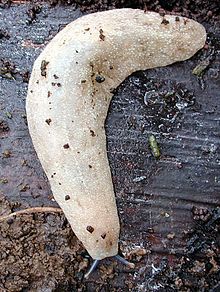Veronicellidae
| Leatherleaf slugs | |
|---|---|
 |
|
| Live individual of Veronicella sloanei | |
 |
|
| Live individual of Laevicaulis alte | |
| Scientific classification | |
| Kingdom: | Animalia |
| Phylum: | Mollusca |
| Class: | Gastropoda |
| (unranked): |
clade Heterobranchia clade Euthyneura |
| Superfamily: | Veronicelloidea |
| Family: |
Veronicellidae Gray, 1840 |
| Type genus | |
|
Veronicella |
|
| Genera | |
|
See text |
|
| Synonyms | |
|
Vaginulidae Martens, 1866 |
|
clade Euthyneura
clade Panpulmonata
clade Eupulmonata
clade Systellommatophora
See text
Vaginulidae Martens, 1866
Meisenheimeriinae Hoffmann, 1925
Sarasinulinae Hoffmann, 1925
Semperulinae Hoffmann, 1925
Imeriniinae Hoffmann, 1928
Pseudoverocinellinae Hoffmann, 1928
The Veronicellidae, also known by their common name the leatherleaf slugs, are a family of pulmonate terrestrial slugs.
The herbivorous molluscs occur mainly in the tropical and subtropical areas of America, Asia and Africa.
They act as intermediate hosts of the rat lung worm Angiostrongylus costaricensis, and act as a vector for other human diseases. They also cause significant damage to crops.
The dorsal surface of these slugs is entirely covered by the mantle or hyponota. These mollusks have a posterior located anus, eyes on contractile (not retractile) tentacles, and no lung or pulmonary organ. In these aspects they are anatomically distinct from most other types of terrestrial slugs, which typically belong to the order Stylommatophora, and which have a forward located anus, and retractile tentacles.
The closely related members of the family Onchidiidae differ from the Veronicellidae by having a pulmonary sac, or lung.
Members of the family can be found in the Central African Republic, Kenya, the Cameroon, tropical West Africa Mexico, the Democratic Republic of the Congo, Thailand, southern Asia, southern China, Taiwan, Cuba, the Highland Rainforests of Puerto Rico,Florida, Dominica,Hawaii, the islands of the Indian Ocean, Australia, Samoa and Guyana.
...
Wikipedia
